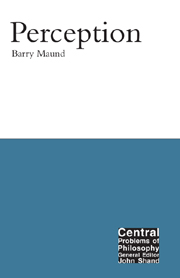Book contents
- Frontmatter
- Contents
- Preface
- 1 The philosophy of perception
- 2 A theory of natural realism
- 3 Theories of perceptual experiences
- 4 Representationalism: representations as natural signs
- 5 Natural realism: Putnam, Austin and Heidegger
- 6 Perception: the argument from illusion
- 7 The phenomenal and phenomenological senses of “looks”
- 8 Types of perceptual content
- 9 The representationalist–intentionalist thesis
- 10 Adverbialist accounts of perceptual experience
- Conclusion
- Notes
- References
- Index
1 - The philosophy of perception
- Frontmatter
- Contents
- Preface
- 1 The philosophy of perception
- 2 A theory of natural realism
- 3 Theories of perceptual experiences
- 4 Representationalism: representations as natural signs
- 5 Natural realism: Putnam, Austin and Heidegger
- 6 Perception: the argument from illusion
- 7 The phenomenal and phenomenological senses of “looks”
- 8 Types of perceptual content
- 9 The representationalist–intentionalist thesis
- 10 Adverbialist accounts of perceptual experience
- Conclusion
- Notes
- References
- Index
Summary
The most natural view to take of perception is that it is a process by which we acquire knowledge of an objective world. We take this world to consist of physical objects and happenings, which exist independently of us and our acts of perceiving, and which are the things we commonly perceive. Problems arise, however, when we reflect on the nature of that process and on how the knowledge is supposed to be acquired. Many of the traditional puzzles of perception arose, for example, when people tried to make sense of the fact that in different circumstances the same things appeared differently, either to different people placed differently, or to the same person on different occasions. Crucial questions that arose were whether we ever know what objects were really like, as opposed to how they appeared, and indeed whether how they appeared had anything to do with what they were really like. Such ancient puzzles were refuelled as the scientific revolution developed, as Galileo, Descartes, Locke and others attempted to make sense of the relationship between perceptual experience and the physical world; and more recently in the philosophy of science, where it has become widely believed that all perception is theory laden and strongly conceptual in nature.
Two different philosophical approaches to perception
Perception is a subject of interest in its own right, from both a philosophical and a scientific point of view.
- Type
- Chapter
- Information
- Perception , pp. 1 - 24Publisher: Acumen PublishingPrint publication year: 2002



